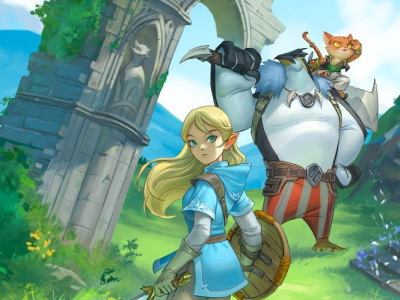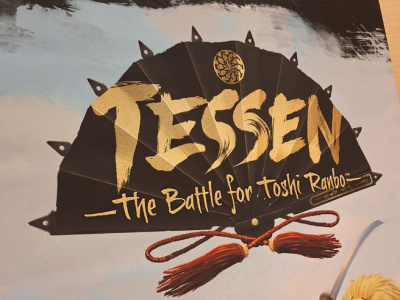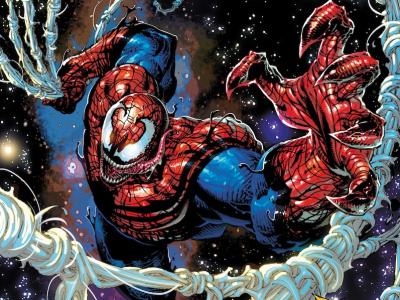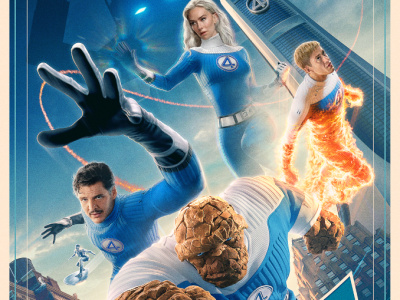
In Part 1 of our annual interview with Marvel Publisher Dan Buckley, we talk about the state of the market, comic prices, and the growing market for digital comics and what that means.
Give us an overview from your perspective of the comic and graphic novel markets so far this year.
It’s another pretty good year. The industry’s a little bit softer year over year, but considering the turmoil though that our economy’s gone through over the last three years experiencing softness the third year into it (single digit softness) is pretty good. I think everyone, the publishers, retailers, and creators, have performed very admirably in tough circumstances. Most of the softness is associated with the single issue sales. Book sales continue to be strong in both the hobby market along with the book market.
Digital comics appeared in force this year as a viable sales channel and promotional channel for our products.
Over the years periodical comics have often been contracyclical with the economy. Why do you think this time’s different?
The graphic fiction business and entertainment as a whole tend to be contra-cyclical, you’re right. I still think they’re acting contra-cyclically. Over a three year period we’re still ahead of the game. The industry has grown, if you took those three years in a row versus where we were a couple years before that.
I think what we’re running into is that people are putting some of their money into buying books, or maybe getting single issues. They may not be buying the third or fourth book. They’re still buying their core books. It’s known out there quite well that people are saving more money than spending it at this point. It could be argued that we didn’t have a big enough event to carry the day, either on the DC or the Marvel side. Marvel did not do a big event over the last twelve months. We’ve had events within each of our lines but we didn’t come out with something as far-reaching as Civil War or Secret Invasion or House of M. So you could attribute the softness to the fact that we decided to dial back a little bit—not in our quality or what we wanted to get out, nor did we want to dial back our sales, but we knew we had to take a breather from a creative and editorial and production standpoint to get everyone on a level set again.
Part of it’s due to the economy, part of it’s probably associated with the fact that we didn’t come out with a huge event this year. It’s a little bit of both, but I would still say we’re operating in a lot of ways contracyclically to what’s been going on out there in the real world.
A year ago when we talked you were just starting to move some of your titles to $3.99. There are probably more at $3.99 now. There’s ongoing kvetching out there about prices. What’s your feeling about the $3.99 price point in this environment?
I think it’s the appropriate price point for the entertainment value and quality that we offer in the books. The $3.99 price point was already the price point for limited series and one-shots before we moved some of our regular series up, and we still have several regular series that are at $2.99. If we want to continue to have the talent and the quality that we offer in those books, it’s a price point that we had to explore. What we offer from an entertainment standpoint is pretty solid and I think we should be proud of that.
You mentioned book stores and comic stores. Anything new going on in mass over the last year?
We have not had any huge changes in mass. Walmart and most of newsstands are still taking a a pretty aggressive stance, especially with our all-ages magazine that we do bi-monthly, but we haven’t had any huge new initiatives in that space. There’s really no big updates on that side.
Let’s move over to digital. You mentioned that there’s been a big expansion this year. Talk a little bit about the reasons for that and where you see it going.
We got into this space initially on our own with our subscription service, and we’ve been very pleased what we’ve done with the subscription service, but it’s very isolated and it’s very ‘us.’ But the piece that’s made digital comics, not just for us but for all the publishers, as something to look at seriously is that we’re beginning to see devices that deliver an entertainment experience that consumers want to have with comics in the digital space. Obviously the iPad was a great lift for digital; I think we’ve all been waiting for that type of device to appear. It’s mobile; the books look good on it; it’s got an intelligent interface to allow you to turn the pages or go through panel by panel. It’s relatively easy to use your interface to scroll through your books and figure out what you want to buy or look at stuff you’ve bought previously. So the biggest change is that the tablet devices are offering us an opportunity to present our product to consumers in the way they want to see it.
What we’re excited about it is that it’s providing us a channel of distribution that allows us to get new readers and intercept people where they’re at. We’re going to be able to remarket to try to get them into retail stores because that’s our most beneficial place to have consumers. In the feeder program that we had, the newsstand business, sales have only gotten steadily worse over the last twenty or thirty years. And this is something that I believe will shore that up.
Are you starting to see that movement of consumers who get exposed to comic material on a digital device and end up buying paper products?
I don’t have anything at this moment that’s quantitative, but we have had a lot of qualitative data. People say ‘I’m going to go to the store and pick it up,’ or said, ‘I went and bought this book.’
One of the things that’s interesting that we do know for sure is that a lot of people are reading digital comics who discover new characters through the browsing and the digital comics experience and then they’ll go buy books tied to that character. Someone might not know much about Elektra when they first pick up a [digital] book. To learn about Elektra they’ll look through and see if they like Elektra. It seems like introducing them to the breadth of characters leads into more purchases on the hard copy side.
We have qualitative data proving that we haven’t gone deep enough on the quantitative standpoint for me to say definitively, this is the ratio. But yeah, we’re definitely hearing that.
You tried at least one experiment with day and date release of a print and digital product. What did you learn from that?
What we learned is that in that instance was that the sales that we got digitally were incremental. According to the forecast that we had for that product, it did not hurt the sales of the product.
The flexibility with which you can deal with release dates is going to have to be done on a product-by-product basis because there’s a lot of promotional value, especially when you’re talking about first issues or stand-alone issues, in having that out there in front of people in the freshest possible way.
It clearly doesn’t mean there’s a uniform release date strategy associated with digital versus print. We’re feeling our way through it. We’re running with it. In that instance, the Iron Man Annual, it was positive.
We have not seen any negative sales effect on print with any of the digital efforts that we’ve shown regardless of release date.
Anything new on the motion comics front?
We did the Iron Man: Extremis one which got released right before the movie, and we did some promotions with stores with it. We’re definitely looking to do more. We are doing some preliminary investigation on our vendors and on how we want to do release strategy around them that complements our publishing and our overall corporate plans. We’ll have a lot more information on that in the next month to three months.
In Part Two of our two-part interview with Marvel Publisher we talk about getting new readers started on Marvel Comics, Marvel’s publishing plans to tie into the company’s two movies next year (Thor and Captain America), some of the changes resulting from the new ownership by Disney, and some things Buckley wants to communicate to the trade (see “Interview with Marvel’s Dan Buckley, Part Two”).







